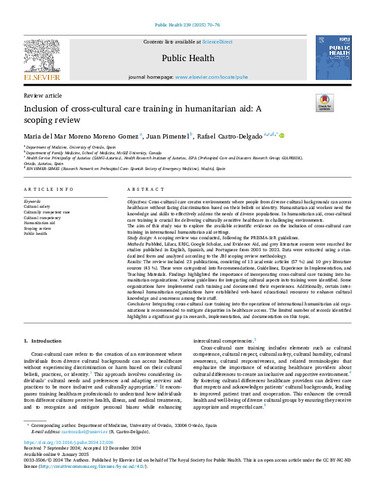Inclusion of cross-cultural care training in humanitarian aid: a scoping review
Autor(es) y otros:
Fecha de publicación:
Versión del editor:
Citación:
Descripción física:
Resumen:
Objectives: Cross-cultural care creates environments where people from diverse cultural backgrounds can access healthcare without facing discrimination based on their beliefs or identity. Humanitarian aid workers need the knowledge and skills to effectively address the needs of diverse populations. In humanitarian aid, cross-cultural care training is crucial for delivering culturally sensitive healthcare in challenging environments. The aim of this study was to explore the available scientific evidence on the inclusion of cross-cultural care training in international humanitarian aid settings. Study design: A scoping review was conducted, following the PRISMA-ScR guidelines. Methods: PubMed, Lilacs, ERIC, Google Scholar, and Evidence Aid, and grey literature sources were searched for studies published in English, Spanish, and Portuguese from 2003 to 2023. Data were extracted using a standardized form and analyzed according to the JBI scoping review methodology. Results: The review included 23 publications, consisting of 13 academic articles (57 %) and 10 grey literature sources (43 %). These were categorized into Recommendations, Guidelines, Experience in Implementation, and Teaching Materials. Findings highlighted the importance of incorporating cross-cultural care training into humanitarian organizations. Various guidelines for integrating cultural aspects into training were identified. Some organizations have implemented such training and documented their experiences. Additionally, certain international humanitarian organizations have established web-based educational resources to enhance cultural knowledge and awareness among their staff. Conclusions: Integrating cross-cultural care training into the operations of international humanitarian aid organizations is recommended to mitigate disparities in healthcare access. The limited number of records identified highlights a significant gap in research, implementation, and documentation on this topic
Objectives: Cross-cultural care creates environments where people from diverse cultural backgrounds can access healthcare without facing discrimination based on their beliefs or identity. Humanitarian aid workers need the knowledge and skills to effectively address the needs of diverse populations. In humanitarian aid, cross-cultural care training is crucial for delivering culturally sensitive healthcare in challenging environments. The aim of this study was to explore the available scientific evidence on the inclusion of cross-cultural care training in international humanitarian aid settings. Study design: A scoping review was conducted, following the PRISMA-ScR guidelines. Methods: PubMed, Lilacs, ERIC, Google Scholar, and Evidence Aid, and grey literature sources were searched for studies published in English, Spanish, and Portuguese from 2003 to 2023. Data were extracted using a standardized form and analyzed according to the JBI scoping review methodology. Results: The review included 23 publications, consisting of 13 academic articles (57 %) and 10 grey literature sources (43 %). These were categorized into Recommendations, Guidelines, Experience in Implementation, and Teaching Materials. Findings highlighted the importance of incorporating cross-cultural care training into humanitarian organizations. Various guidelines for integrating cultural aspects into training were identified. Some organizations have implemented such training and documented their experiences. Additionally, certain international humanitarian organizations have established web-based educational resources to enhance cultural knowledge and awareness among their staff. Conclusions: Integrating cross-cultural care training into the operations of international humanitarian aid organizations is recommended to mitigate disparities in healthcare access. The limited number of records identified highlights a significant gap in research, implementation, and documentation on this topic
ISSN:
Notas Locales:
OA ATUO24
Ficheros en el ítem





